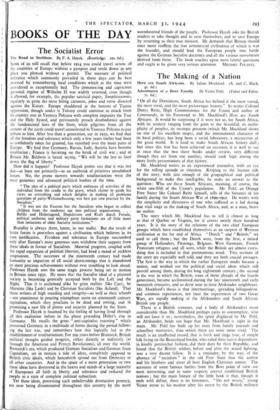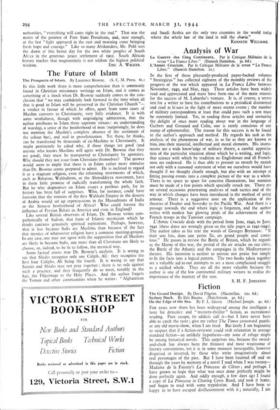The Making of a Nation
Adventures of a Boer Family. By Victor Pohl. (Faber and Faber. 7s. 6d.)
"Or all the Dominions, South Africa has behind it the most varied, the most vivid, and the most picturesque history." So writes Colonel Denys Reitz, High Conrunisstoner tor the Union and author of Commando, in his Foreword to Mr. Mockford's Here are South Africans. It would be surprising if it were not so, for South Africa, with its scenery ranging from the grim to the beautiful, its multi- plicity of peoples, its strategic position (which Mr. Mockford shows on one of his excellent maps), and the international character of its local politics, has long been a social laboratory, a microcosm of the great world. It is hard to make South African history dull ; but since this feat has been achieved on occasion, it is well to say at once that the two short books under review, very different though they are from one another, should rank high among the more lively presentations of that history. •
Mr. Mockford writes as an experienced journalist, with an eye for the telling episode or situation. Keeping to the human side of the story, with jtIst enough of the geographical and political background to make this intelligible, he seeks an answer to the question : Who are these South Africans, meaning, of course, the white one-fifth of the Union's population. Mr. Pohl, an Orange Free Stater like Colonel Reitz himself, tells of the fortunes of his family during the South African War of 1899-i9o2. He writes with the simplicity and directness of one who suffered as a lad during that vital stage in the making of South Africa, and, as a man, bears no malice.
The story which Mr. Mockford has to tell i almost as long as that of Quebec or Virginia, for it covers nearly three hundred years. It is the story of the relations of the two chief European groups which have established themselves as an outpost of Western civilisation at the far end of Africa. " Dutch " and "British," we used to call them ; but the Dutch were, from the first, a mixed group of Hollanders, Flemings, Belgians, West Germans, French Protestant refugees and all sorts, while the British are almost every- thing that is included in that portmanteau word. Two sections of the story are especially well told, and they are both crucial passages. The first is the way in which the earlier European stocks became a nation, and worked out the political and social ideas which still prevail among them, during the long eighteenth century ; the second is the way in which the British, some of them already of the fourth generation, became acclimatised during the late nineteenth and early twentieth centuries, and so drew near to their Afrikander neighbours. Mr. Mockford's thesis is that intermarriage, spreading bilingualism, and common experiences, not least the experiences of two Great Wars, are rapidly making of the Afrikanders and South African British one people.
There is a British remnant, and a body of Afrikanders more considerable than Mr. Mockford perhaps cares to contemplate, who will not have it so ; nevertheless, the spirit displayed by Mr. Pohl, an Afrikander, holds out hope that Mr. Mockford is right in the main. Mr. Pohl has built up his story from family journals and schoolboy memories, than which there are none more vivid. The result is an unaffected record, that is fresh and rings true, of simple folk living on the Basutoland border, who ruled their native dependants in kindly patriarchal fashion, did their duty by their Republic, and found that the British soldier, before and after the actual fighting, was a very decent fellow. It is a reminder, by the way, of the absence of " racialism " in the old Free State that the author and his brothers and sister all bore English Christian names. The accounts of some famous battles from the Boer point of view arc most interesting, and in some respects correct established British notions; but the main feature of the little book is that., though it ends with defeat, there is no bitterness. "Do not worry," young Victor wrote to his mother after his arrest by the British military
authorities, "everything will come right in the end." That was the motto of the greatest of Free State Presidents, and, sure enough, at the last "light appeared in the east and morning came bringing fresh hope and courage." Like so many Afrikanders, Mr. Pohl sees the dawn of this better day for the two white peoples of South Africa in the generous peace settlement of 1902. South African history teaches that magnanimity is not seldom the highest political























 Previous page
Previous page